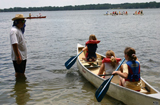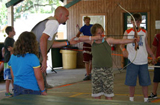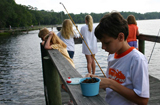4-H Camping
Lessons for Life
This summer, come to one of Florida 4-H's residential camps for a high-intensity, high-impact 4-H experience! These programs--planned by Extension agents and faculty--provide the educational experiences of group living in the outdoors and include spending at least one night away from home.
- Florida’s 4-H Camps
- Camping Snapshot
- Camping Makes a Difference
- Providing Positive Experiences
- Benefits of Leadership
- Challenges & Opportunities
Florida’s 4-H Camps
Florida 4-H maintains four wonderful rustic facilities that are available to all counties throughout the year for residential experiences. Most counties host four-day and five-day camp sessions during the summer months, but the camps are also available throughout the year.
The four camps--Cherry Lake, Cloverleaf, Ocala, and Timpoochee--are administered through the State 4-H Office Camping Office. County faculty plan the camping experiences either individually or in groups.
Camping Snapshot
This list gives a brief overview of the amount of participation and energy involved in Florida’s 4-H camping programs.
- 35 weeks of camp
- 2050 campers
- 106 volunteers
- 72 faculty and staff
- 26,736 meals served
- 57,500 youth contact hours of educational and recreational programs
Camping Makes a Difference
Between 2005 and 2006, approximately forty-five percent of more than 800 4-H club members participated in residential camping. Youth assessments of life skills revealed slightly higher average scores for members who attended 4-H camps compared to those did not.
According to campers, volunteers, and agents, the valuable outcomes of 4-H camping are the skills that youths gain in the areas of environmental awareness, getting along with others, social interaction, and developing independence. Other skills developed by campers varied from camp to camp.
Club members who go to camp are also very active in other 4-H opportunities, with approximately eighty-five percent participating in county events, sixty-five percent in district events, and forty-seven percent in other state or national events. Multiple opportunities seem to improve youth development of competencies and skills.
Providing Positive Experiences
The American Camp Association has reported several important findings, compiled from the results of national surveys of camping programs.
- While strengths vary by camp type and sponsor, all camps have the potential to provide positive experiences foundational to practicing successful life skills.
- Camps provide more positive developmental environments for youth than some other programs, especially in skill building and providing supportive relationships with adults and peers.
- The value of camp for campers is enhanced by attending camps in multiple summers or for sessions that are as long as practicable.
- Campers perceive safety at camp differently than adults. Directors were surprised to learn that their efforts in risk management address different safety issues than the ones that concern campers.
- Campers, other than counselors-in-training, report few opportunities for meaningful involvement in leadership and decision-making about things that matter.
Benefits of Leadership
According to the American Camp Association, the greatest challenge for all youth programs--including camps, after-school programs, and schools--is to provide meaningful opportunities for youth to learn and practice life-building skills in leadership and decision-making.
Youth who are trained as cabin counselors and youth leaders generally reap additional benefits, compared to those who do not participate in leadership activities at camp.
Challenges & Opportunities
Part of achieving American Camp Association Accreditation--one of Florida 4-H’s long-term goals--involves training 4-H summer staff. Training weekends cover age appropriate programming, purpose and structure of camp, teambuilding, risk management, and a host of other topics. Program Directors are working with their summer staff to bring together good teams that will be ready for each camp.
Florida 4-H faculty and staff look forward to a great summer of camping. The planning time is well worth the long-term impact on youth. With good risk management and quality programs, youth will learn and grow.
To view the Summer 2007 camping schedule and get more information about 4-H, read the March 2007 issue of the Clover Voice (pdf).
Condensed from:
"Florida 4-H Camping Snapshot," by Marilyn M. Norman, in The Clover Voice, March 2007, Volume 2, No. 3 (pdf). Published by: Florida 4-H (3/2007).



Related Sites
- Florida 4-H Calendar of Events
- Florida 4-H Camps & Specialty Camps
- 4-H Camps: Information for Parents

